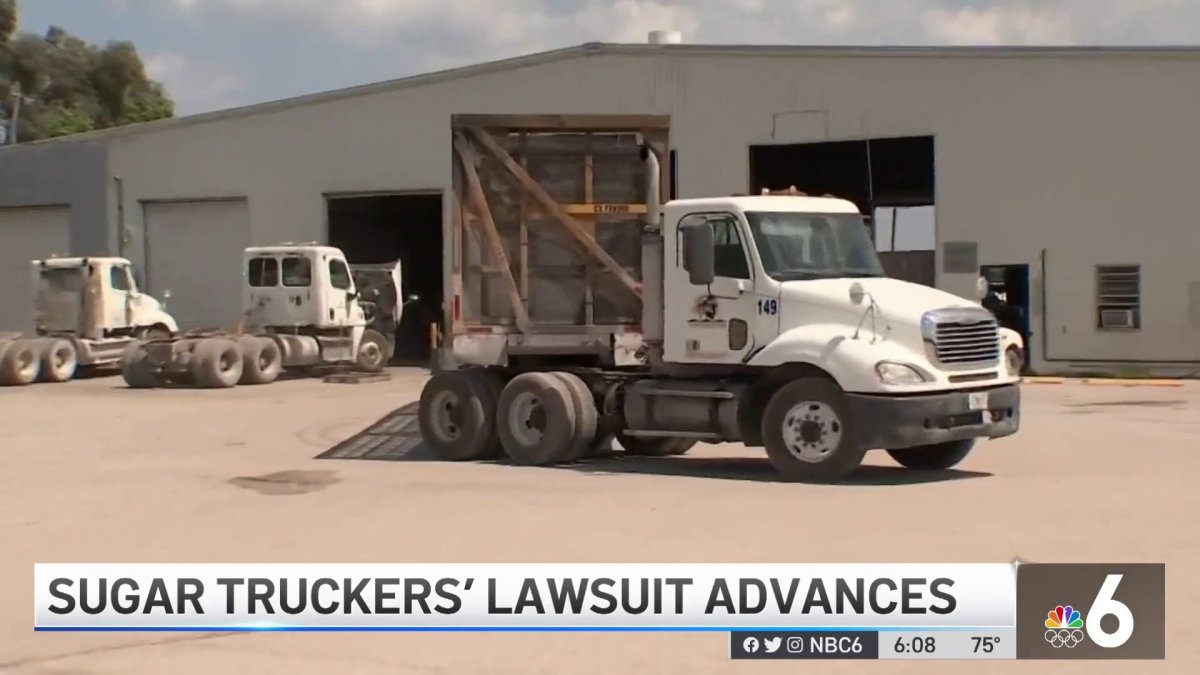
A lawsuit filed by South Florida truckers claiming U.S. Sugar and an affiliated partnership cheated them out of work by hiring foreign workers in their place is moving forward, but without some of its more serious allegations. NBC 6’s Tony Pipitone reports
A lawsuit filed by South Florida truckers claiming U.S. Sugar and an affiliated partnership cheated them out of work by hiring foreign workers in their place is moving forward, but without some of its more serious allegations.
A Palm Beach County circuit judge has ruled the breach of contract and related fraud claims can go forward against U.S. Sugar Corp. and Caloosa Transport LLP, a trucking partnership managed by U.S. Sugar and in which it holds a 50 percent interest.
But the judge dismissed counts alleging U.S. Sugar aided and abetted Caloosa and that both entities conspired together to commit the fraud.
The judge also struck from the case allegations that U.S. Sugar made misrepresentations and false statements to the U.S. Department of Labor when it certified it needed to hire 50 non-citizen temporary workers for the 2019-20 growing season because there were no American workers available to do the job.
Get South Florida local news, weather forecasts and entertainment stories to your inbox. Sign up for NBC South Florida newsletters.
The nine truck drivers and companies who sued had contracts with Caloosa that could have paid them $30 an hour, up to seven days a week from October 2019 through May 2020. The temporary workers were paid $11.24 an hour driving Caloosa’s trucks.
But, the suit alleges, they were dismissed just two weeks into the deal after U.S. Sugar was able to hire the non-citizen temporary foreign workers under the H-2A workers’ program to replace them.
The suit alleges Caloosa Transport and U.S. Sugar are essentially one and the same, which is why the judge dismissed conspiracy claims – one cannot conspire with oneself.
And the judge said the plaintiffs cannot accuse U.S. Sugar of lying to get the H-2A approvals because, even if true, it has “no bearing on the case as plaintiffs never heard such statement” so they could not have had “reliance” on them when they entered into the contracts.
Therefore, Judge Jamie Goodman ruled on Oct. 8, the allegation is “irrelevant and immaterial” to the underlying fraud claim.
In an August 2019 letter, U.S. Sugar’s agent told the U.S. Department of Labor it has an “emergency situation” and “harvested crop will rot in the field” unless it can hire 50 foreign workers with H-2A visas.
By completing the H-2A application, the company certified it "has been unsuccessful in locating sufficient numbers of qualified U.S. applicants for the job opportunity" and "there are insufficient U.S. workers available in the area(s) capable of performing the temporary services or labor in the job opportunity."
Local
The drivers, who used their own trucks to begin the work in October 2019, told NBC 6 that was news to them.
Attorneys for both parties and U.S. Sugar have not responded to requests seeking comment on the ruling.
In court, U.S. Sugar did prevail in its effort to strike what it called “scandalous, immaterial and impertinent” allegations about it making false statements to the Department of Labor. Both Caloosa and U.S. Sugar argued the truckers’ claim that they were replaced by H-2A visa workers is false.
They said the visa workers were hired as employees of U.S. Sugar, while the truckers were independent contractors who entered into an agreement with Caloosa.
That will be for a jury to decide, if the lawsuit survives further challenges from the defendants.
The case will move toward a July 2022 trial date.